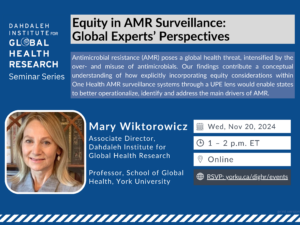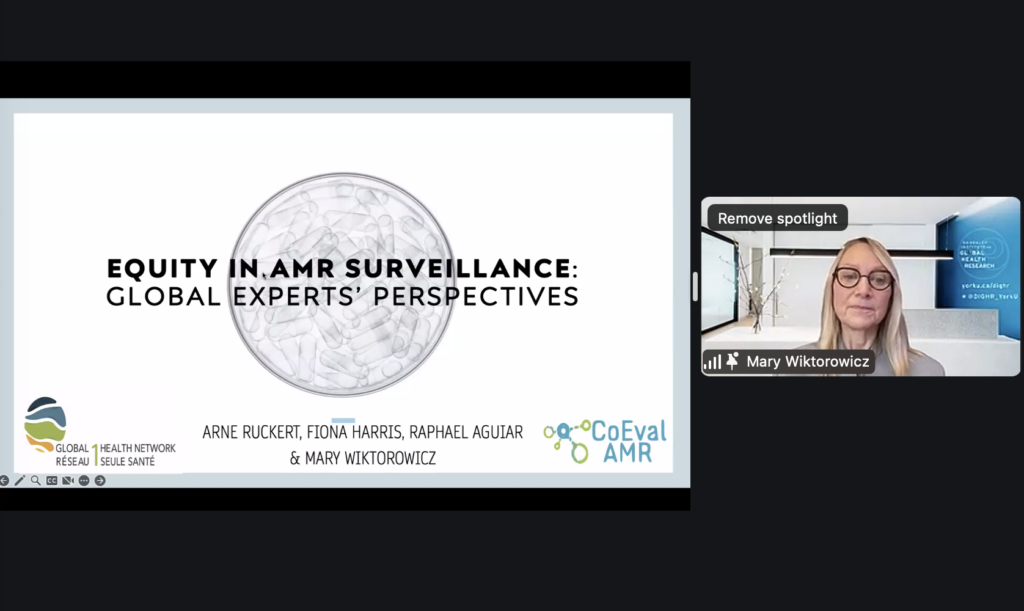Post
Published on January 3, 2025

On November 20, Dahdaleh associate director Mary Wiktorowicz delved into the topic of equity in antimicrobial resistance (AMR) surveillance, offering insights into how equity can be embedded in global surveillance systems. The discussion emphasized equity as both a distinct domain and a critical component integrated across all domains. Using a Political Ecology lens, Dr. Wiktorowicz highlighted systemic threats and global inequalities that shape health outcomes, advocating for a collective structural responsibility approach to addressing AMR.
The presentation outlined governance as a reflexive and collaborative process where stakeholders share resources and dialogue to manage complex challenges. Current research identified key entry points for equity within AMR surveillance systems, including governance and evaluation frameworks. Interviews with 17 key informants from diverse sectors revealed themes such as the conceptualization of surveillance, global redistributive dimensions, data concerns and sectoral imbalances.

Challenges to achieving equity in AMR surveillance included issues of data access, ownership, interoperability and literacy. Disparities between the Global North and South were prominent, with resource limited countries often unable to implement recommended systems due to impractical guidelines. Sectoral imbalances further compounded the problem, with human health receiving more attention and funding than sectors like agriculture and environmental health.
A conceptual model of equity in AMR surveillance was introduced, addressing factors such as geographic disparities, social determinants of health and socioeconomic inequities. The model emphasized the importance of targeting root causes, supporting equity deserving groups and fostering intersectoral collaboration. Trust building and data sharing across sectors and disciplines were identified as critical to improving equity.
The presentation concluded by calling for systemic interventions including equitable resource distribution, improved collaboration and a shift toward addressing the structural determinants of AMR. This integrated approach aims to make equity a central focus in AMR surveillance systems worldwide.
Watch the seminar presentation below: https://www.youtube.com/watch?v=9D2Cu-fZcjs
Connect with Mary Wiktorowicz.
Themes | Global Health Foresighting |
Status | Active |
Related Work |
N/A
|
Updates |
N/A
|
People |
You may also be interested in...
Recap – Opportunities and Challenges in the Era of Polycrisis, with Achim Steiner
Members of the Dahdaleh community were invited to attend a special Empire Club of Canada talk given by Achim Steiner, administrator of the United Nations Development Programme (UNDP), on December 13. While addressing the disappointment ...Read more about this Post
Recap – Fall 2022 Graduate Research by Dahdaleh Global Health Scholars
The Dahdaleh Institute proudly supports graduate research and scholarly and creative activities in line with the three themes of planetary health, humanitarianism, and foresighting at York University. We held our 3rd Annual Global Health Graduate ...Read more about this Post
Recap – Science is Necessary But Not Sufficient for Positive Public Policy Impacts
On January 25, Dr. Jean-Jacques Rousseau used his broad experiences in government in Canada and abroad to comment on instances when scientific and technical advice fails to have a positive influence on public policy: "Science ...Read more about this Post
